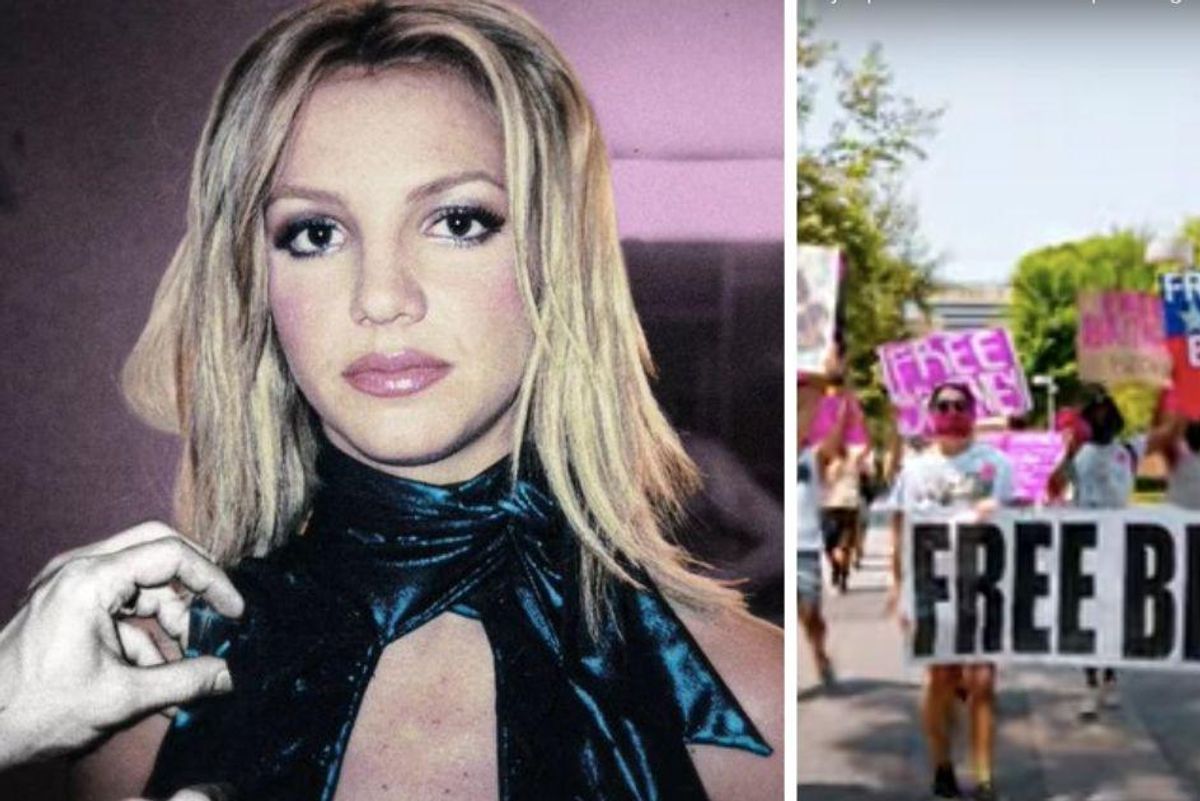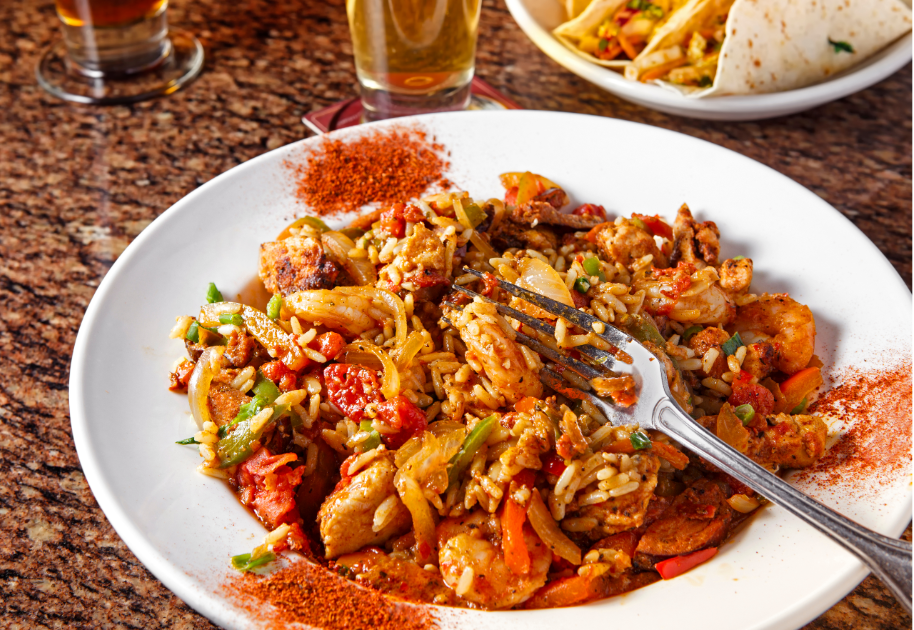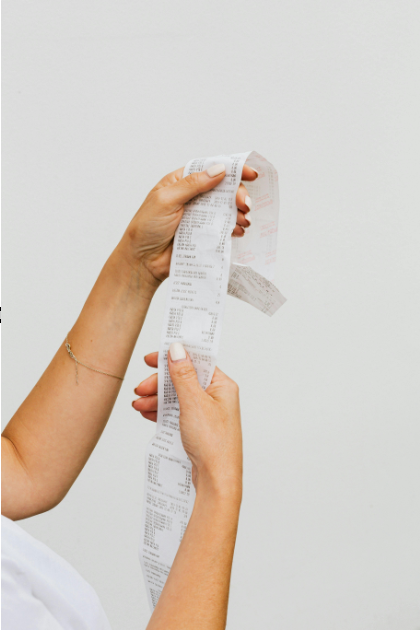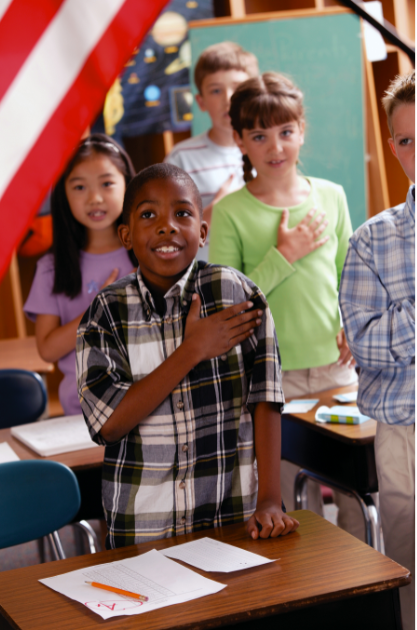The new Britney Spears documentary is making people completely re-think the pop star's life

I never thought I'd voluntarily watch a documentary about Britney Spears, much less recommend one. While her music is fine, celebrity culture does nothing for me and the news surrounding her always felt too tabloidy for my taste. Over the years, I've brushed off Spears' personal saga as clickbaity fame drama not worth my time and energy—a dismissal I now regret.
After seeing multiple people I admire and respect share how the New York Times' Britney Spears documentary impacted them, I decided to check it out. And all I can say is—holy crap. There's so much to her story that we should all be aware of, because so much of it involves all of us.
This post will contain spoilers, so if you'd rather just watch the documentary yourself, search for "The New York Times Presents: Framing Britney Spears" on Hulu. (You can sign up for a 7-day free trial if you don't have a subscription.)
The focus of "Framing Britney Spears" is the growing #FreeBritney movement—the push from Spears' fans to let her have control over her life. For the past 12 years, Spears' has had a court-appointed conservator of her person and her estate, meaning that she doesn't have agency over decisions about her life or her money. For nearly all of that time, her father Jamie has served that conservator—a fact that is strange in and of itself, since he hadn't played an active role in her life prior to her public breakdown.
Every documentary has a purpose, and this one clearly leads us in the direction of the #FreeBritney message. We're shown how capable she had been even when she was young and how she had always held the reins of her own career. We see how she's continued to be able to perform and work at a high level, despite the fact that she supposedly doesn't have the mental capacity to handle her own affairs.
There are plenty of revelations that point to people in her life manipulating the situation for their own gain. You have to wade through some kind of cringey connect-the-dots conspiracy thinking from obsessed fans in the documentary, but there are legitimate questions about why the conservatorship remains in place for someone who appears to have her wits about her. We don't have access to her medical records, but there are millions of people who live with mental health issues—even severe ones—and don't have the right to make decisions about their life taken away from them like this.
That's one element that should concern us all.
Another huge piece of the Britney story that I wasn't aware of was how absolutely relentless the paparazzi was with her from the get-go. Celebrities get followed and photographed all the time, of course, but with Britneys Spears it was literally all the time, up in her face, surrounding her car, swarming her every step she took.
And she was so young when this all started. While she clearly had the ambition to become a singer, she was a sweet, approachable young woman who didn't seem equipped to tell these grown men surrounding her with cameras and questions to back the eff off. At first, she seemed to enjoy the attention, but that luster only lasts so long. And these grown men with their cameras were so predatory, even while they talked nicey to her. Super icky.
Watching the constant flashing of cameras and bombardment of questions she endured nearly gave me a panic attack, and I'm a middle-aged adult. But because of society's insatiable appetite for the "sexy schoogirl," paparazzi could make up to $1 million per photo. So they hounded and hounded her, and the more drama in her life began to unfold, the worse it got.
Combine the paparazzi with the way the media treated her and, like I said, holy crap. The questions journalists and show hosts thought they could ask this young woman, the details of her private life they thought they were entitled to, and the cruelty they purposefully subjected her to is shocking. So many of the questions she was expected to answer wouldn't even be asked today, much less answered. (Can you imagine someone in today's media straight-up asking a teen girl if she was still a virgin? Or asking about her breast size?)
One of the things pointed out in the documentary is that there's a misogynistic infrastructure and apparatus ready and waiting to come for a woman if that's what our vulturous society decides to do. The media clearly plays a huge role in that, and they came for Britney in full force.
When Spears and Justin Timberlake broke up, Timberlake ended up controlling the media narrative, which basically made her seem like a slut. He even made a revenge music video with a look-alike of her—yuck.
Diane Sawyer said in a segment that Britney had disappointed mothers all over the country and pointed out that the wife of the governor of Maryland said she would shoot Britney Spears if she had the opportunity. She asked Britney what she thought about that, indicating that she had legitimate concerns as a mother.
Seriously? Saying she wanted to shoot her is just an expression of motherly concern?
After Britney married Kevin Federline and had her first baby, she was almost immediately painted as an unfit mother. And the paparazzi still wouldn't let up.
Matt Lauer asked her what she could do about the paparazzi, and she said, "I don't know. I don't know." Then she broke down crying. He asked her if getting them to stop hounding her was her biggest wish, and she said it was. At that point, she was 23 or 24 and had been dealing with this stuff for years.
By the time the documentary gets to Britney's infamous head-shaving (Britney asked a hairdresser to shave her head, and when they refused, she took the shears and did it herself) and her beating the side of a paparazzi's truck with an umbrella, those behaviors seemed less like a cry for help and more like a justified "eff y'all."
Of course, there are details about her mental health history that we are not privy to. She has had issues with substance abuse according to court documents, and there have been numerous reports of truly erratic behavior from various reputable outlets. It seems quite clear that she's in need of some kind of mental health treatment, but does that justify someone taking total control over her life and finances?
From this documentary, it appears many in Britney's life may not have her best interest at heart, or whose "best interest" shifted with the tens of millions of dollars she rakes in as a working pop star. And so many questions remain. Why does the conservatorship remain if she's as functional as she appears to be? Is she on board with the idea of a conservatorship in general, or did she just not want her dad to serve in that capacity?
Jamie no longer has total control—his own health issues in 2019 caused him to step down from being conservator of her person, and a court case in November made a bank representative co-conservator of her estate along with Jamie. But is all of that really still necessary?
And what about the media's complicity in all of this? Glamour Magazine has issued an apology to Britney Spears, writing on Instagram, "We are all to blame for what happened to Britney Spears—we may not have caused her downfall, but we funded it. And we can try to make up for that."
Spears' boyfriend of four years, Sam Asghari, doesn't appear in the documentary, but he made a rare statement criticizing Britney's father on Instagram after it came out, saying he has "zero respect" for Jamie and calling him "a dick." But this documentary also leaves one with a feeling of distrust for pretty much everyone close to Britney. There's just so much money at stake, too many people who have taken advantage, and too many unknowns to feel 100% good about anyone in her life at this point.
I walked away from this documentary with concerns about civil rights for people with mental illness, concerns about misogyny in the media, concerns about how our obsession with fame can literally destroy lives, and concerns about this individual woman's well-being.
It's worth watching, even if you're not a celebrity documentary watcher. Underneath the over-the-top fandom is an important story that needs to be told.
The New York Times Presents | Framing Britney Spears - Season 1 Ep. 6 Highlight | FXwww.youtube.com
And according to Page Six, we may be getting more of Britney's story from her own perspective, as she's reportedly working on a documentary about her life. That's one we'll all be on the lookout for.
- Talk show host makes all other hosts look absurd during devastating ... ›
- 13 hidden life lessons in the life and art of Britney Spears. - Upworthy ›
- Britney Spears shared a moving post on Instagram in response to ... ›
- Teacher blames parents for entitled kids - Upworthy ›
- Psychotic disorders are my specialty. Here's what you should know. - Upworthy ›
- Macaulay Culkin recalls how John Candy flagged his dad's 'monster' behavior before anyone else - Upworthy ›




 American portion sizes are colossal.
American portion sizes are colossal. Tax shouldn't be a not-so-fun surprise at the end of your shopping trip.
Tax shouldn't be a not-so-fun surprise at the end of your shopping trip.  A trip to the doctor shouldn't break the bank.
A trip to the doctor shouldn't break the bank. This totally isn't weird at all. Right?
This totally isn't weird at all. Right? It's a choice.
It's a choice.  America loves extra sugar in savory foods.
America loves extra sugar in savory foods.
 Princess Odette Girl GIF by The Swan Princess
Princess Odette Girl GIF by The Swan Princess  Rose GIF
Rose GIF  sailor moon GIF
sailor moon GIF  river phoenix 80s GIF
river phoenix 80s GIF 
 All of this will be ours one day. Yay.
All of this will be ours one day. Yay.  Elderly woman with white hair on phone, sharing a story about a dead person her child has never met.
Elderly woman with white hair on phone, sharing a story about a dead person her child has never met.  Surprised elderly man in blue shirt against a yellow background.
Surprised elderly man in blue shirt against a yellow background. Elderly woman in pink shirt using a smartphone on a garden swing.
Elderly woman in pink shirt using a smartphone on a garden swing. TV for waking. TV for sleep.
TV for waking. TV for sleep.  Elderly man using a magnifying glass to read a piece of mail
Elderly man using a magnifying glass to read a piece of mail
Mom is totally humiliated after her kindergartner tells the teacher what she does for work
She was clearly mortified.
A mom is embarrassed by her child.
One of the great joys and stresses of parenting is that you never know what will come out of your child’s mouth. When you have young, inquisitive kids, they can say really inappropriate things to people without realizing they were being rude or possibly offensive. TikTok influencer Aurora McCausland (@auroramccausland), known for her DIY cleaning tips, recently told a funny story on the platform about how her son believes she makes a living. The problem was that she heard about it from her child's teacher.
Mom is embarrassed by her child
“The other day, I went and picked my five year old up from school and when I get to his classroom his teacher pulls me inside and says, ‘Hey, today he wanted to tell us about what Mommy does for work and said that Mommy makes videos in her bedroom but only when I'm [he’s] not at home,” McCausland recalled.
Given her body language while telling the story, McCausland was clearly mortified after hearing what her child said to his teacher. It makes it look like she may be posting videos to adult sites while her child is at school, which most people wouldn’t want their son’s teacher to know about.
The good news is that another teacher was there to clarify the young boy's comments by adding, “I think she makes TikTok videos.” The uncomfortable situation was a great invitation to chat with her son about what she does for a living. “So I have to have a conversation with my son about how he tells people what I do for work,” she finished her video.
The funny video went viral, earning over 1.7 million views on TikTok, and inspired many people to share the times when their children had funny ways of explaining their careers. The commenters were a great reminder to parents everywhere that if your child says something embarrassing, it's ok, just about everyone has been through it.
Moms share their most embarrassing moments
A lot of parents spoke up in the comments to show McCausland that she's not the only one to feel embarrassed in front of her child's teacher.
"My son told everyone that we were homeless (because we don’t own our home, we rent)," KBR wrote.
"I work in ortho.. my daughter told her teacher I steal people's knees bc she heard me talking to my husband about a knee replacement," Aingeal wrote.
"My son told a teacher we were living in our car over the summer. Camping. We went camping," Kera wrote.
"In kinder, my son thought Red Bull was alcohol and told his teacher I liked to have beer on the way to school," Ashley wrote.
My niece told her teacher her mom and dad work at the wh*re house. They work at the courthouse," Ellis wrote.
"My husband works as a table games dealer at a casino. Kindergartener, 'Daddy's a Dealer!' We now start every school year clearly stating he works at the casino," CMAC
"My son said we lived in a crack house…There’s a tiny chip in the wall from the doorknob," KNWerner wrote.
"My dad is a hospice chaplain and officiates a lot of funerals. My son and nephew were asked by their preschool teacher if their papa was retired or had a job. They told her his job was to kill people," Tiffyd wrote.
"My son said "my dad left me and I'm all alone" to a random person at the zoo. My husband was just at work," Shelby.
"I am now in my 70s. In my gradeschool, during the McCarthy era, I told my teacher my dad was a communist. He was an economist," Crackerbelly wrote.
"In Kindergarten, my daughter told her teacher that mommy drinks and drives all the time. Coffee. From Starbucks," Jessica wrote.
"Well I once told my kindergarden teacher a man climbs over our fence to visit my mom when her husband is not home... It was a handy man who came to fix gates when they were stuck," Annie wrote.
Ultimately, McCausland’s story is a fun reminder of how children see things through their own unique lens and, with total innocence, can say some of the funniest things. It’s also a great warning to parents everywhere: if you aren’t clear with your kids about what you do for a living, you may be setting yourself up for a very embarrassing misunderstanding. So, even if you think they know what you do ask them as see what they say, you could save yourself from a lot of embarrassment.
This article originally appeared last year and has been updated.